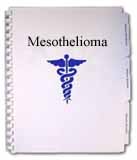|
Mesothelioma and Lung Cancer News - Return to Menu
Making a Scarlet Letter of Asbestos Crime
By MICHELLE YORK
SYRACUSE - December 30, 2004 - CRAIG A. BENEDICT lives much of his life slightly out of breath. If he is not dashing to the courtroom to prosecute cases as an assistant United States attorney here, he is on his bicycle training for another triathlon or, perhaps, playing with his three children and their menagerie of pets.
If he were sick, if his lungs couldn't help him keep up his hectic pace, he would be devastated.
Knowing this provides some insight into why Mr. Benedict, 50, has spent years taking on contractors who ignore safety regulations in removing asbestos - an environmental crime that can cause excruciatingly painful deaths in workers decades after exposure. "People who have asbestosis feel like they have soaked their lungs in cement," Mr. Benedict says. "They're so dry and brittle and unable to expand and contract. It's like a slow suffocation."
He has won convictions in two of the most significant asbestos cases in the country - the latest involving a father and his son.
Raul and Alexander Salvagno owned a contracting business near Albany that operated for 10 years. Their failure to follow safety standards makes it very likely that some of their workers will develop asbestos-related cancers and other illnesses, according to the testimony of Dr. Stephen Levin, the medical director of the Irving J. Selikoff Center for Occupational and Environmental Medicine at the Mount Sinai School of Medicine in New York City.
After a five-month trial in federal district court here, the Salvagnos were convicted last spring of racketeering and running a criminal enterprise. Alexander Salvagno, the son, was sentenced to 25 years in federal prison and his father to 19 years and seven months. They are appealing the convictions.
Defense lawyers say the Salvagnos didn't know that their employees were not taking safety precautions. But prosecutors contend that workers for the Salvagnos' company ripped asbestos from 1,555 buildings in New York State without taking basic safety measures. One employee testified that he worked during a blizzard and that the air inside the building was so thick with asbestos fibers that it looked as if it was snowing there, too.
Prosecutors said that the failure to contain the asbestos accelerated the work, lowering the Salvagnos' largest expense - payroll.
The Salvagno case was the "largest, most-significant asbestos prosecution in U.S. history," said Jane M. Kenny, an administrator for the Environmental Protection Agency regional office in New York.
Even after the Salvagnos are sent to jail, Mr. Benedict says, the case will not go away.
"We are still finding all sorts of victims," he says. "It's happening slowly and steadily. We're continuing to find places where people just now are realizing that serious contamination has been left behind."
Before the Salvagno case, Mr. Benedict won a conviction in 2003 against Joseph Thorn for illegally removing asbestos from more than 1,100 buildings. Mr. Thorn was sentenced to 14 years in prison.
So how did a prosecutor in a medium-size city end up pursuing and winning two of the country's largest asbestos cases?
It's not that the area has a high concentration of asbestos or a rush of corrupt contractors. Instead, Mr. Benedict says that he and his team of investigators have become adept at uncovering suspected wrongdoing. "Environmental crimes are always about money," Mr. Benedict said.
Because unlawful contractors cut corners to make more money, Mr. Benedict recruited investigators who were former supervisors at the Internal Revenue Service.
Asbestos cases also require a prosecutor willing to undertake long investigations.
"His mind is always working," said his wife, Dr. Judy Benedict, an anesthesiologist. "I find notes around the house leading to the door so he doesn't forget to take them to work. He's intense."
Mr. Benedict has always been that way. Growing up in Hamden, Conn., he and his three brothers were competitive wrestlers and nightly pinning matches made for a lively home atmosphere.
Being one of four brothers and attending an all-male prep school led Mr. Benedict to conclude that he didn't really understand women, so he responded with his typical zeal - by enrolling in the predominantly female Sarah Lawrence College. The school joined the National Collegiate Athletic Association because Mr. Benedict was the first student there who wanted to compete in intercollegiate sports.
He knew early on that he wanted a job involving the environment - a decision motivated by listening to astronauts after their space missions talk about the earth's vulnerabilities and by his boyhood adventures on the mountain in his hometown.
After graduating from law school at the University of Miami, he went to work for the Environmental Protection Agency, becoming its first criminal enforcement attorney. In 1993 he signed on as an assistant United States attorney for the Northern District of New York.
Mr. Benedict became aware of potential asbestos-related safety violations in 1998 when a man who had worked for several asbestos removal companies arrived at his office one day and described what he saw as wrongdoing. Investigators spent years verifying the man's allegations before indictments were handed up. Mr. Benedict focused on the Salvagnos early on as the region's worst offenders.
Mr. Benedict's track record has brought national attention and other assistant United States attorneys seek his advice as they start investigating complaints of asbestos fraud in their own regions.
BACK home on a recent Saturday, Mr. Benedict was the one on the defensive after his 9-year-old son, Tucker, said his dad cheated at lacrosse by pinning his sons to the ground. "It's true," Tucker insisted over his father's protests.
Mr. Benedict also didn't hesitate to recruit the best athletes in the region to compete on his team for an annual triathlon, an endurance race that combines swimming, bicycling and running.
"When we show up to compete, we do it seriously," he said. "You do something, you should do it well." |

































